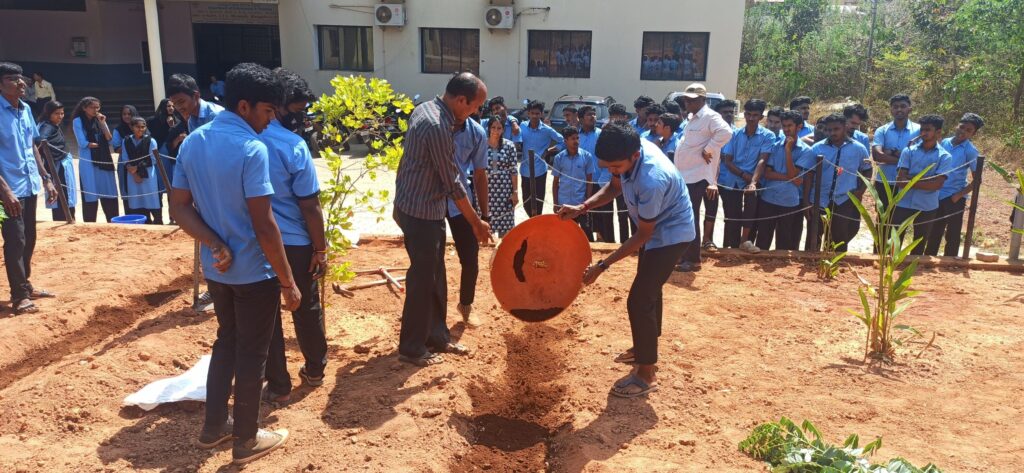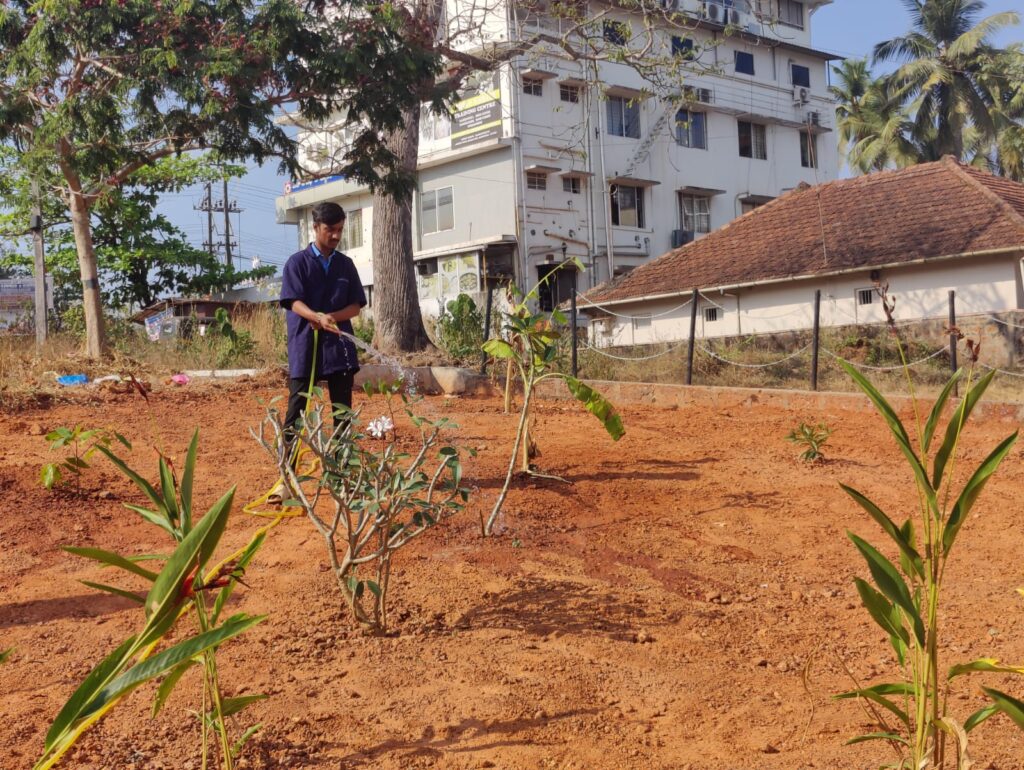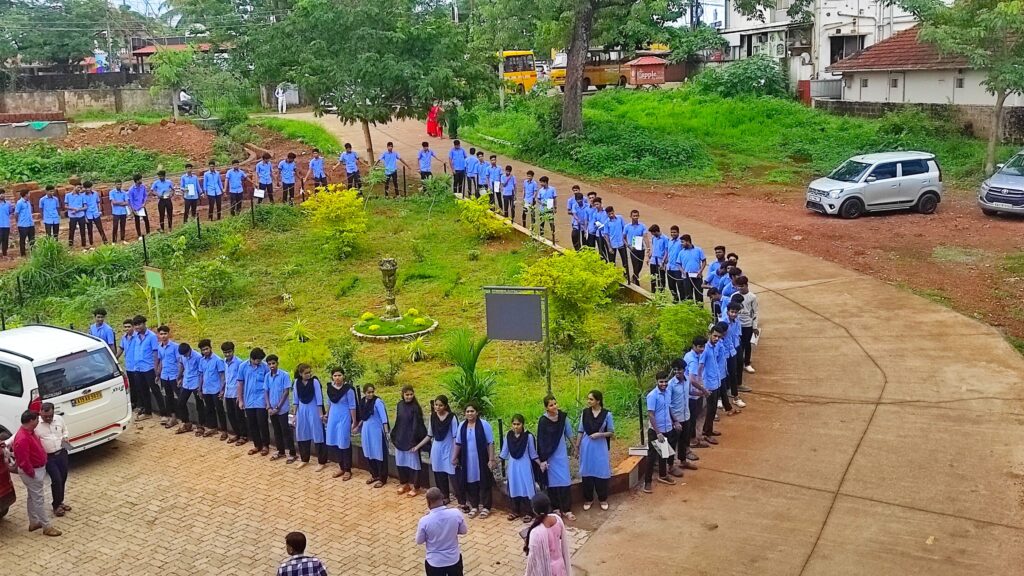Story
Country’s First Green ITI: Government Women’s ITI at Mangaluru Leads the Path to Sustainability
As you drive through Kadri Hills in Mangaluru, it is hard to miss the lush green patch of land at the entrance of the Government Women Industrial Training Institute, Mangaluru. But this botanical haven which has different shades of green is not your usual well-manicured lawn.
Details
This green patch has been meticulously developed by the students and the faculty of the Government Women’s Industrial Training Institute (ITI). The institute has earned the distinction of becoming the country’s first green institute. This has been done under Quest Alliance’s pilot project where three ITIs in the country have turned green. S. Shivakumar, principal of the institute in an interview talks of the ITI’s ten-month journey and the transformation from a garbage disposal site to an institute that soon aspires to become a learning lab for green practices.

How has the environment in Mangaluru changed over the years?
Mangaluru's environment has undergone significant transformations over the years, with notable shifts from lush greenery to an expanding concrete jungle. Once known for its verdant landscapes, the city's current state is marked by dwindling green spaces, soaring temperatures, and a concerning rise in deforestation. The pressing need to prioritize environmental conservation has become evident as the city's trees are being felled at an alarming rate.
Moreover, the coastal areas are facing the alarming issue of receding coastlines. This points to the critical impact of factors like erosion and sea-level rise, which are likely driven by a combination of natural processes and human activities. The convergence of these challenges underscores the necessity to rethink and prioritize sustainable practices in order to safeguard Mangaluru's natural beauty and ecological balance. It's high time to shift our focus towards embracing green initiatives and strategies that can help revive and rejuvenate the city's environment for future generations.
How has the institute transformed after Quest Alliance’s intervention?
The green ITI initiative has brought about remarkable transformations within the Government Women’s ITI, Mangalore. Earlier, we would only plant saplings on Environment day and we have made a significant effort now to move beyond tokenism. The entire campus has undergone a profound metamorphosis, a change that has garnered recognition even from the elected representatives. A campus once plagued by the careless disposal of garbage has now become an inspiring model. The Mangaluru City Corporation has now decided to establish a park next to the campus. Students participated in the cultivation of vegetables, reaping bountiful yields of brinjal, tomato, lady's finger, green chilli, and more. This agricultural endeavor is meticulously planned, adhering to a cyclical growth pattern. Even the fallen trees haven't gone to waste and our students used it to fence the garden. Students have also made their own water sprinklers.
Besides creating a green area in the campus, we have also attempted to impart green skills among the students. The certification these students receive upon completion of the program has piqued the interest of numerous small-scale industries, especially in the domain of electronic vehicles.
How did the students and faculty respond to these initiatives?
The response to these initiatives from both students and faculty has been overwhelmingly positive. The initiatives were largely driven by the students and faculty themselves, instilling a deep sense of ownership and dedication. The students exhibited a remarkable eagerness to engage with the projects, particularly the gardening initiative. Their curiosity and desire to learn about cultivating plants were evident, with many students even choosing to forego their vacation plans and remain on campus to take care of the plants. The faculty members, too, demonstrated a keen interest in these initiatives, with many of them actively contributing to the project by providing seeds for the garden.

The waste segregation initiative gained considerable traction within the institute. The collective effort put forth by students and faculty to effectively implement waste segregation underscores their commitment to making these initiatives successful.
Your institute has become a model for many institutes. Have you chalked out any future plans?
Our future endeavors encompass a range of strategic initiatives aimed at enhancing the institute's sustainability and community engagement. We want to establish a kitchen garden, which not only serves as a practical learning experience for the students but also contributes to the institute's self-sufficiency in producing fresh, organic produce. Alongside this, we will make an effort towards fostering a heightened sense of environmental awareness within the community surrounding the campus.
Among the sustainable practices we intend to implement is rainwater harvesting within the campus. We would also like to replenish the borewell to ensure a sustainable water supply within the campus. Our ambitious plan this year is to also turn into a plastic-free institute. We also aim to become a plastic free institute this year and want a portion of our institute to be powered by solar power.
We hope to transform our institute into a dynamic learning lab. This entails creating an immersive educational environment where sustainable practices are not only taught but also actively demonstrated. By integrating sustainability into the fabric of our institution, we aim to empower our students to become environmentally conscious citizens and innovators, equipped with the knowledge and skills to drive positive change in the wider world.

Quest Alliance has also developed the green curriculum. Will you be implementing this at your institution?
The green curriculum covers topics such as green mindset, evolution of agriculture and industry, sustainable practices, emerging green job opportunities, future trends and judicious resource utilization. This will certainly be useful to students and we will implement it tentatively from September 2023. To begin with, we will also encourage our students to do apprenticeships in green careers and those interested can also pursue this as their career.